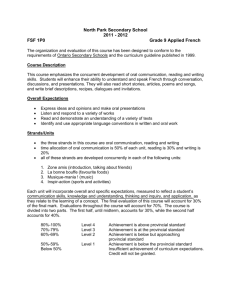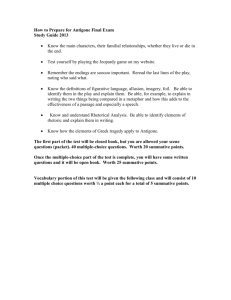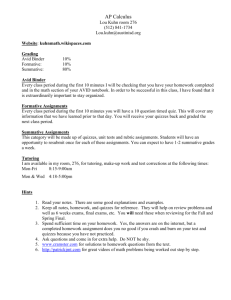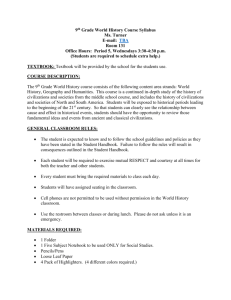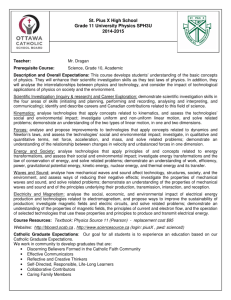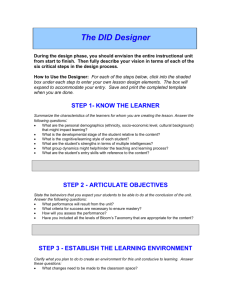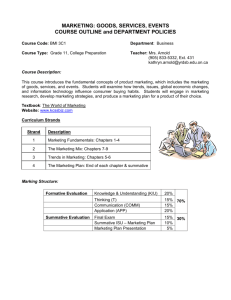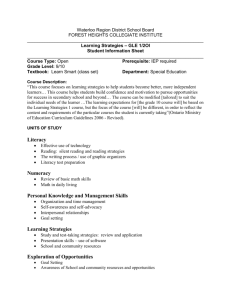NORTH PARK SECONDARY SCHOOL
advertisement
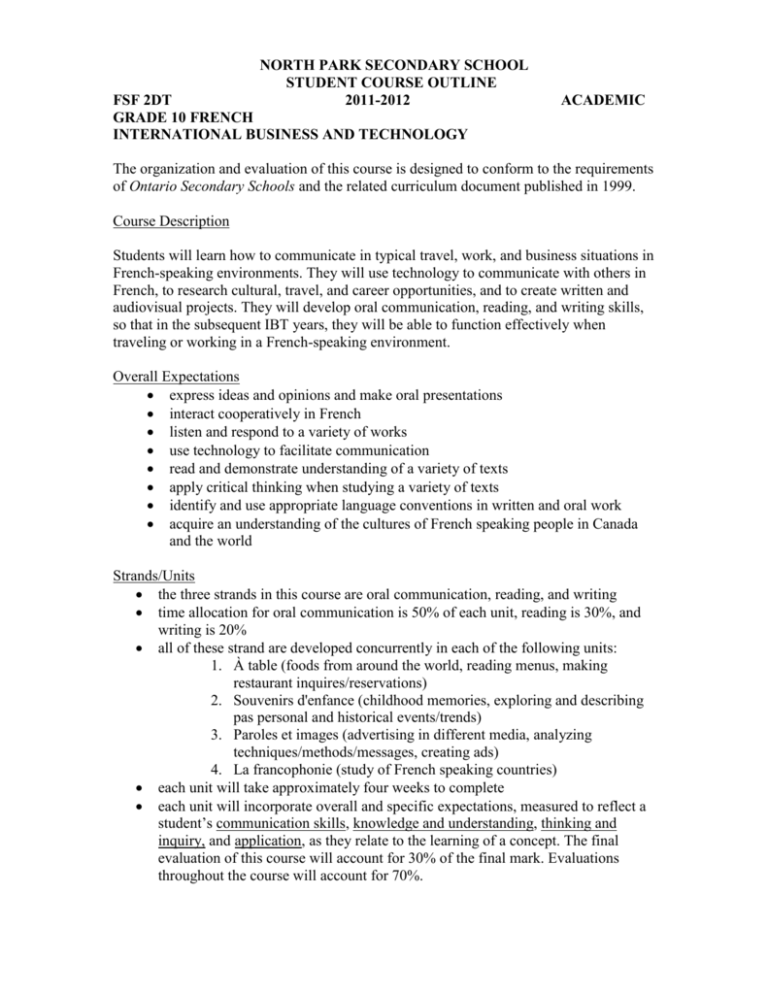
NORTH PARK SECONDARY SCHOOL STUDENT COURSE OUTLINE 2011-2012 FSF 2DT GRADE 10 FRENCH INTERNATIONAL BUSINESS AND TECHNOLOGY ACADEMIC The organization and evaluation of this course is designed to conform to the requirements of Ontario Secondary Schools and the related curriculum document published in 1999. Course Description Students will learn how to communicate in typical travel, work, and business situations in French-speaking environments. They will use technology to communicate with others in French, to research cultural, travel, and career opportunities, and to create written and audiovisual projects. They will develop oral communication, reading, and writing skills, so that in the subsequent IBT years, they will be able to function effectively when traveling or working in a French-speaking environment. Overall Expectations express ideas and opinions and make oral presentations interact cooperatively in French listen and respond to a variety of works use technology to facilitate communication read and demonstrate understanding of a variety of texts apply critical thinking when studying a variety of texts identify and use appropriate language conventions in written and oral work acquire an understanding of the cultures of French speaking people in Canada and the world Strands/Units the three strands in this course are oral communication, reading, and writing time allocation for oral communication is 50% of each unit, reading is 30%, and writing is 20% all of these strand are developed concurrently in each of the following units: 1. À table (foods from around the world, reading menus, making restaurant inquires/reservations) 2. Souvenirs d'enfance (childhood memories, exploring and describing pas personal and historical events/trends) 3. Paroles et images (advertising in different media, analyzing techniques/methods/messages, creating ads) 4. La francophonie (study of French speaking countries) each unit will take approximately four weeks to complete each unit will incorporate overall and specific expectations, measured to reflect a student’s communication skills, knowledge and understanding, thinking and inquiry, and application, as they relate to the learning of a concept. The final evaluation of this course will account for 30% of the final mark. Evaluations throughout the course will account for 70%. PAGE 2 Format of Evaluation 80-100% 70-79% 60-69% 50-59% Below 50% Level 4 Level 3 Level 2 Level 1 Achievement is above the provincial standard Achievement is at the provincial standard Achievement is below, but approaching, the provincial standard Achievement is below the provincial standard Insufficient achievement of curriculum expectations; credit will not be granted Types of Evaluations Knowledge and Thinking and understanding Inquiry Communication Application Oral Communication: -use complete sentences in oral presentations -understand + follow specific instructions -practice correct pronunciation, expression, intonation Reading: - dramatizations, posters, ads in response to readings Oral Communication: -listening quizzes -role-playing -interviews - oral personal questions Oral Communication: -prepare + give group oral presentation -ask + answer questions about media works Oral Communication: -short dialogues, ads, announcements - use French in group activities - use new vocabulary and structures Reading: - comprehension quizzes - vocabulary quizzes Reading: - identify key facts+ vocabulary words in reading texts - use a dictionary correctly - read for information Writing: - dictations - directed compositions - grammar quizzes Writing: - revise, edit + proofread writing Reading: -guided oral/written compositions based on readings -read aloud with correct pronunciation -correct completion of forms (eg. job application) Writing: - journals, diaries, postcards, e-mails, text messages, letters, invitations, ads - prepare a survey summarizing date Writing: - short descriptive paragraphs - use appropriate language structures in writing Resources/Department Specific Expectations: Students will be provided with a textbook, Voyages 1, and other resources such as readers. All school materials are to be returned in original condition. If any damage is incurred to school materials, the student is responsible for replacement value. All students should also have a French-English dictionary: the Larousse or Robert-Collins are good choices. The online dictionary www.wordreference.com is also recommended but can be used only for single words or expressions. Any use of translating agent is strictly prohibited and will result in a mark of zero. Students much bring appropriate writing and learning materials to class everyday. This may include the laptop and/or paper and writing materials. Homework will be assigned and checked on a daily basis. Students will be evaluated on a regular basis (usually daily, with a level assigned at the end of each week) for their oral proficiency (speaking and participating correctly in class oral activities) using the following rubric: PAGE 3 Oral Language Proficiency Rubric Participates in class oral practice/discussion Uses structures and vocabulary correctly Unacceptable Does not participate Level 1 Participates occasionally (at least once per class) Level 2 Participates fairly often (2-3 times per class) Level 3 Participates frequently (at least 4 times per class) Does not use correct structures/vocabulary (errors interfere seriously with comprehension) Uses a few correct structures and vocabulary, with limited effectiveness Uses some correct structures and vocabulary, with some effectiveness Uses most structures and vocabulary correctly, with considerable effectiveness Level 4 Participates frequently ( at least 5 times per class, and/or with a high degree of depth/development) Uses all or almost all structures and vocabulary correctly, with a high degree of effectiveness Deadlines for Summative Assessments Some summative task deadlines are negotiated; some are absolute. Tasks that are not submitted on either a negotiated or an absolute deadline will not be evaluated, and a mark of zero will be assigned. It is the student’s responsibility to seek assistance from the teacher when she/he is unable to complete a task or assignment, and to negotiate an agreed-upon extension. It is not acceptable to advise the teacher of difficulty the day before or on the day a task/assignment is due. Missed Summative Assessments – Due to Absence Students who know ahead of time that they will miss an assessment due to field trips, doctor’s appointments, or other legitimate reasons, have a responsibility to notify the subject teacher as soon as possible that they are going to miss a summative assessment. Students who are absent due to family responsibility or illness will have their parent(s) contact the school via a phone call, if the student is legitimately absent on the day of a summative assessment. If the student misses a summative assessment activity due to truancy, a mark of zero will be assigned. Truancy occurs when a student has NO documented or legitimate reason for missing the class. A legitimate reason includes a note or phone call from the parent/guardian or administrative approval. On the day of the student’s return from a legitimate absence, it is their responsibility to make arrangements with the teacher to make up the missed work/take the missed summative assessment activity. Should the student fail to make such arrangements on the day of their return, the student will receive a mark of zero. PAGE 4 Additional Information Attendance : regular attendance at school is critical for the student’s learning and achievement of course expectations Plagiarism : including electronic theft and misrepresentation of original work, cheating or presenting another’s work as one’s own, theft of evaluation instruments, use of unauthorized aids and false representation of identity, will result in appropriate consequences, including a zero on the evaluation, suspension from school, loss of credit, or contact with police. Use of online software: students may use on-line dictionaries for translation of single words or 2-3-word expressions, but may NOT use translation software. The majority of language translation software contains multiple errors, particularly in verb conjugation and colloquial expressions. Use of translation software in assignments or tests will be treated as plagiarism and a mark of zero will be assigned. Submission of written assignments: to facilitate correction and editing of assignments by the teacher, students must submit paper copies of any evaluation that is not oral or technology-based. These should be double-spaced, to allow for correction symbols and comments. Dear Parent/Guardian, This course outline contains information about requirements, expectations, and evaluation in your son’s/daughter’s French course. If, after reading this, you have any questions, please feel free to contact your son’s/daughter’s teacher at: (905) 456-1906. (Ext. 476) Please sign below to indicate that you have read this outline, and have your son/daughter return it to his/her French teacher. _____________________________________ Parent/Guardian signature _____________________________________ Student’s name ___________________________ Date
